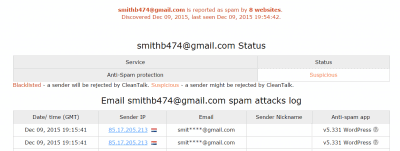The first “spam” email was sent in 1978 and we’ve been battling it ever since. It’s an annoyance that has become less of a problem as email services have improved their filtering, but for people running a business online, contact form spam is still a big headache.
You can skip my explanation / rant and jump straight to the solution if so desire!
On one side of the equation, making sure you receive all submissions on your contact form is very important. You don’t want potential clients being lost to over zealous spam filters. On the other side, you want to make sure it’s easy for potential clients to contact you, you don’t want to make your contact forms impossible to use with screen after screen of fields and captchas – the kind of things we used to do to prevent “bots” from filling forms automatically.
Taking it personally
Now, when you’re just looking after your one business, you may wonder what all the fuss is about. Just delete a few spams each morning?
When your business is helping people get the best from their website and online presence, and much of the spam is (completely false) claims that their websites are set up badly, then those hundreds of emails are very annoying!
Enter (and exit) the Honeypot
For a while we had the bots on the run. Clever captchas and honeypots (hidden fields that bots fill in but humans don’t) were preventing the spam filled forms from being submitted. But this year the quantity of contact form spam has just grown and grown. The spammers have realised – why use easily fooled bots when intelligent (but very cheap) labour exists? If humans are filling in the forms then they will pass all the robot checks.
I finally lost my patience when one of these spammers sent me a link… to buy the spamming software they were using!
I won’t link to them, I’ve got no intention of helping them, but one screenshot from their marketing will explain a little of how they work…
So the spammer can either import a list of contact forms, or the software can use a Google search to find relevant forms. The spammer sets up their message and then clicks next as each form pops up on their screen. They can see any error messages, fix problems or fill in captchas before clicking to the next form.
No wonder our bot prevention is failing!
So how did we fix it?
After one particularly annoying spam, I had Googled the email address to see if I could track down the real sender. And I found the address listed in a CleanTalk report, like this one:
This was pretty good marketing – if I had been signed up for the CleanTalk service, I wouldn’t have received that spam. Doesn’t get clearer than that!
CleanTalk to the rescue
So I explored CleanTalk some more. It works on contact forms, comments, subscription forms, you name it. And it’s not just for WordPress (although the simple to install WordPress plugin was good for me!).
It’s not a free service, but neither is Akismet (one of the most popular options – provided by the people who brought us WordPress.com). It is a lot cheaper though, especially when you’ve got lots of sites to look after.
I set up the 14-day trial on a handful of sites and the spam stopped. Stone cold, dead. You can log on to your CleanTalk dashboard to see what has been rejected and check for false positives if you wish – the two week period was nowhere near up when I decided to install the plugin on all our other sites!
The Proof of the Pudding…
To ensure reliable delivery, we use Mandrill to deliver all emails from our sites. One of the (many benefits) of doing this is being able to monitor email volumes. We installed CleanTalk about a third of the way along this graph:
Oh look – all the spam went!
…is in the Eating
Don’t just take my word for it, sign up to CleanTalk to find out for yourself!
Yes, our links to CleanTalk are affiliate links:
- This doesn’t make us rich, it just keeps us spam free for longer
- We only recommend products and services we use ourselves or for our clients







